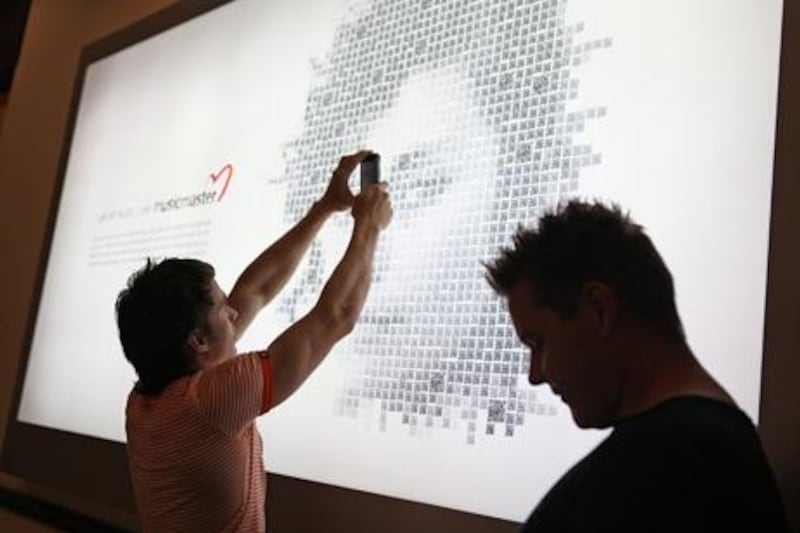Barcode tags that can be scanned by mobile phones to direct consumers to websites and videos and, bizarrely perhaps, tell them where the fish in their local supermarket has been caught, may soon become commonplace.
And some analysts believe the technology could give a boost to print advertising, which is under pressure from the rise of the internet and will be further challenged by forthcoming web publications for the iPad and other tablet devices.
For consumers, the system is easy to use. You can download a bar code reader on to your mobile from an application store and scan items by taking pictures of them. A number of the new smartphones coming on to the market already have built-in scanners.
"The key is the delivery of the content, and making sure that it is a seamless and pleasant experience," says Shaun Edwardes, the chief executive of Ignition Mobile, a company based in the UK that specialises in interactive advertising for phones.
___________________________________
Follow our Business tweets - twitter.com/biznationaluae
___________________________________
New players in the Middle East market could prompt more interest in mobile tag advertising.
Ignition Mobile has just launched an operation in the UAE and plans its first campaign on behalf of a client later this month.
"We see tag reading as the future of advertising. We see it as the ability to take physical advertising into the digital world in a very effective and seamless manner for the consumer," says Mr Edwardes.
There are a growing number of advocates for mobile tags in the region. Sana Bagersh, the editor of Tempo, a magazine in Abu Dhabi that carries mobile tags alongside stories to direct the reader to additional features, says the technology is widely used in Japan. In some fish markets, all the produce is barcoded to provide consumers with specific information. "You go to buy fish … and each fish is actually tagged, which is amazing. In Japan, tags are everywhere," she says.
Shoppers can scan the fish to find out its weight, plus details of where and when it was caught. Across the country, countless other products are similarly tagged, and the codes are used widely in publications and advertising.
Even so, Ms Bagersh says the reaction in the Gulf region to such technology, from advertisers and readers of her magazine, has so far been muted. "More and more people are scanning [codes in the magazine], but the numbers are still disappointingly low," says Ms Bagersh. "If it's something that's interesting, we can get 200 scans. But sometimes if it's not very interesting, we may get 90 or 100. But the number is increasing."
Ms Bagersh is also the chief executive of BrandMoxie, a marketing agency that promotes mobile tagging technology to its clients. The agency says the market needs to develop further before the technology takes off.
The tags, or mobile activation codes, come in various forms, including black and white quick response (QR) codes, which were invented in Japan where they remain extremely popular.
The Microsoft Tag, a colour version of the QR code that is now the most popular form used in magazines in the US, emerged more recently. Microsoft, the software giant behind the tag, said in October two billion had been printed since it was unveiled in January 2009.
Ms Bagersh believes tagging has a big future in the Emirates.
"The applications are being defined and explored as we speak," she says.
"The reason we thought it was a great idea is that the UAE has the highest penetration of mobile phones in the world."
Ms Bagersh also sees applications for mobile tags in environments such as malls and hospitals, and to provide information about public transport.
"We really think tagging has great potential, even at a governmental level," Ms Bagersh says. "I think Abu Dhabi can do it as a city - why not become the next Tokyo?"
Other regional brands are also starting to embrace the use of mobile tags. Music Master, a Saudi-owned download website, has recently launched an advertising campaign in Dubai that invites consumers to scan hundreds of QR codes in search of free tracks.
Advertising executives also say the format has potential.
Lex Bradshaw-Zanger, the regional director for digital strategy and innovation in the Mena regionfor the US marketing agency Leo Burnett, says ad campaigns using tags are still suitable for only "a small segment of the population".
"We've tried but I don't think we've ever delivered on them. But they come up a lot in conversation [with clients]," he says. "The biggest challenge is getting people to use them … But when you have broken through that barrier there's enormous potential."
Omar Kabbani, the managing director for the UAE at the media agency MEC, says tags enable advertisers to measure the success of a particular campaign. "It is a simple and accurate way for us to track effectiveness and justify spending for the future," he says.
Mr Kabbani says the technology will become more widespread when all smartphones come with built-in barcode readers. For many models today, a reader has to be downloaded from an application store.
Mr Edwardes says his company is in negotiations to run tag ad campaigns in local shopping centres.
"It's going to be [about] coupons, and … what kind of activities are going on within the mall. And we believe that will be a very important vertical within the market in the Gulf," he says.
Going shopping in the UAE could soon involve scanning your dinner before you buy it - even if you fancy fish.





